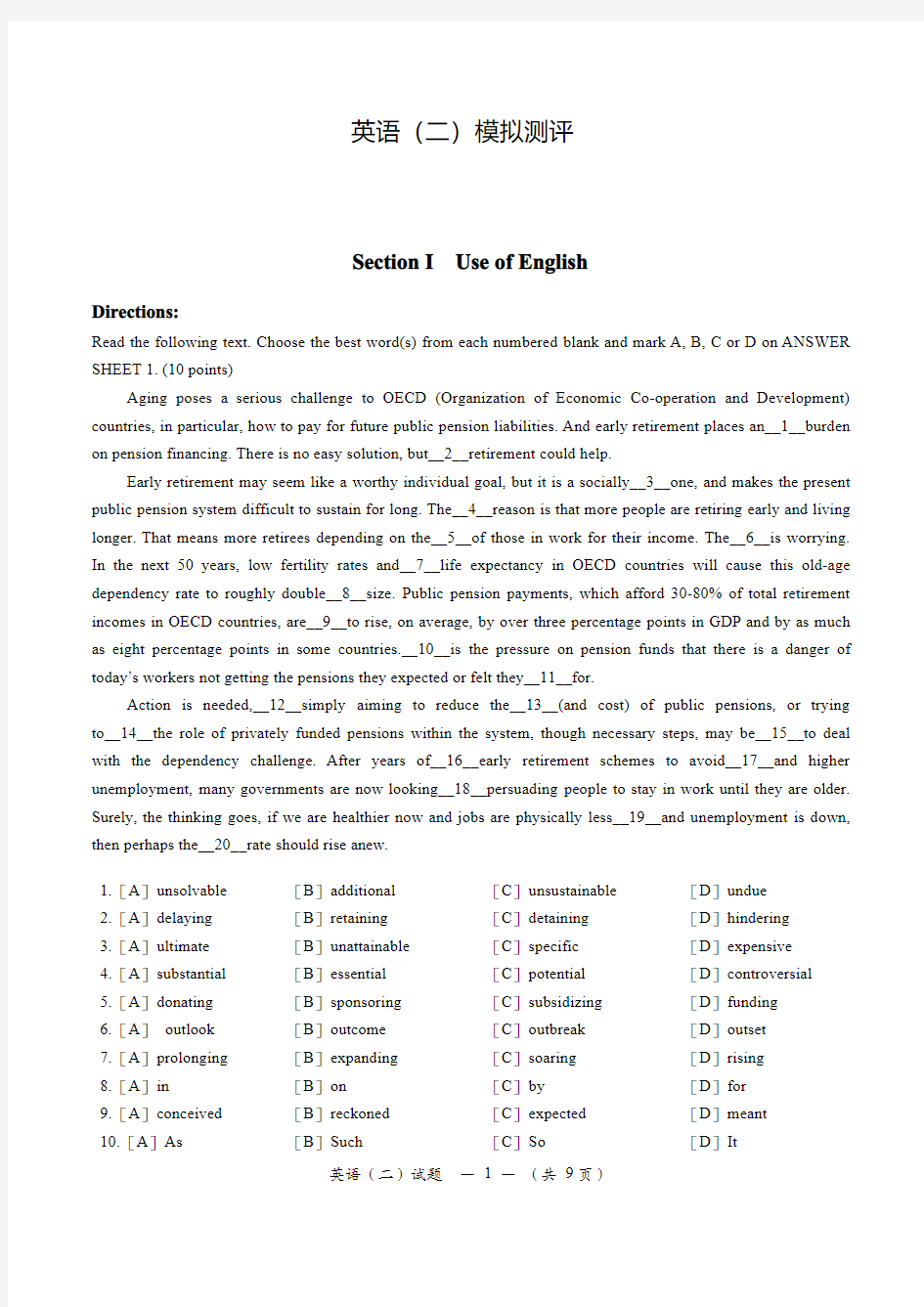英语二模拟测评

- 1、下载文档前请自行甄别文档内容的完整性,平台不提供额外的编辑、内容补充、找答案等附加服务。
- 2、"仅部分预览"的文档,不可在线预览部分如存在完整性等问题,可反馈申请退款(可完整预览的文档不适用该条件!)。
- 3、如文档侵犯您的权益,请联系客服反馈,我们会尽快为您处理(人工客服工作时间:9:00-18:30)。
英语(二)模拟测评
Section I Use of English
Directions:
Read the following text.Choose the best word(s)from each numbered blank and mark A,B,C or D on ANSWER SHEET1.(10points)
Aging poses a serious challenge to OECD(Organization of Economic Co-operation and Development) countries,in particular,how to pay for future public pension liabilities.And early retirement places an__1__burden on pension financing.There is no easy solution,but__2__retirement could help.
Early retirement may seem like a worthy individual goal,but it is a socially__3__one,and makes the present public pension system difficult to sustain for long.The__4__reason is that more people are retiring early and living longer.That means more retirees depending on the__5__of those in work for their income.The__6__is worrying. In the next50years,low fertility rates and__7__life expectancy in OECD countries will cause this old-age dependency rate to roughly double__8__size.Public pension payments,which afford30-80%of total retirement incomes in OECD countries,are__9__to rise,on average,by over three percentage points in GDP and by as much as eight percentage points in some countries.__10__is the pressure on pension funds that there is a danger of today’s workers not getting the pensions they expected or felt they__11__for.
Action is needed,__12__simply aiming to reduce the__13__(and cost)of public pensions,or trying to__14__the role of privately funded pensions within the system,though necessary steps,may be__15__to deal with the dependency challenge.After years of__16__early retirement schemes to avoid__17__and higher unemployment,many governments are now looking__18__persuading people to stay in work until they are older. Surely,the thinking goes,if we are healthier now and jobs are physically less__19__and unemployment is down, then perhaps the__20__rate should rise anew.
1.[A]unsolvable[B]additional[C]unsustainable[D]undue
2.[A]delaying[B]retaining[C]detaining[D]hindering
3.[A]ultimate[B]unattainable[C]specific[D]expensive
4.[A]substantial[B]essential[C]potential[D]controversial
5.[A]donating[B]sponsoring[C]subsidizing[D]funding
6.[A]outlook[B]outcome[C]outbreak[D]outset
7.[A]prolonging[B]expanding[C]soaring[D]rising
8.[A]in[B]on[C]by[D]for
9.[A]conceived[B]reckoned[C]expected[D]meant
10.[A]As[B]Such[C]So[D]It
11.[A]should pay[B]paying[C]be paid[D]would pay
12.[A]but[B]for[C]and[D]thus
13.[A]multitude[B]implementation[C]application[D]generosity
14.[A]exaggerate[B]augment[C]magnify[D]multiply
15.[A]insufficient[B]influential[C]inefficient[D]intrinsic
16.[A]advancing[B]previous[C]ahead[D]preceding
17.[A]suspensions[B]abundances[C]redundancies[D]discrepancies
18.[A]for[B]to[C]about[D]at
19.[A]turbulent[B]strenuous[C]compact[D]intricate
20.[A]dependency[B]fertility[C]present[D]mortality
Section II Reading Comprehension
Part A
Directions:
Read the following four texts.Answer the questions below each text by choosing A,B,C or D.Mark your answers on ANSWER SHEET1.(40points)
Text1
We’re moving into another era,as the toxic effects of the bubble and its grave consequences spread through the financial system.Just a couple of years ago investors dreamed of20percent returns forever.Now surveys show that they’re down to a“realistic”8percent to10percent range.
But what if the next few years turn out to be below normal expectations?Martin Barners of the Bank Credit Analyst in Montreal expects future stock returns to average just4percent to6percent.Sound impossible?After a much smaller bubble that burst in the mid-1960s Standard&Poor’s5000stock average returned6.9percent a year (with dividends reinvested)for the following17years.Few investors are prepared for that.
Right now denial seems to be the attitude of choice.That’s typical,says Lori Lucas of Hewitt,the consulting firm.You hate to look at your investments when they’re going down.Hewitt tracks500,000401(k)accounts every day,and finds that savers are keeping their contributions up.But they’re much less inclined to switch their money around.“It’s the slot-machine effect,”Lucas says.“People get more interested in playing when they think they’ve got a hot machine”—and nothing’s hot today.The average investor feels overwhelmed.
Against all common sense,many savers still shut their eyes to the dangers of owning too much company stock. In big companies last year,a surprising29percent of employees held at least three quarters of their402(k)in their own stock.
Younger employees may have no choice.You often have to wait until you’re50or55before you can sell any company stock you get as a matching contribution.
But instead of getting out when they can,old participants have been holding,too.One third of the people60 and up chose company stock for three quarters of their plan,Hewitt reports.Are they inattentive?Loyal to a fault? Sick?It’s as if Lucent,Enron and Xerox never happened.
